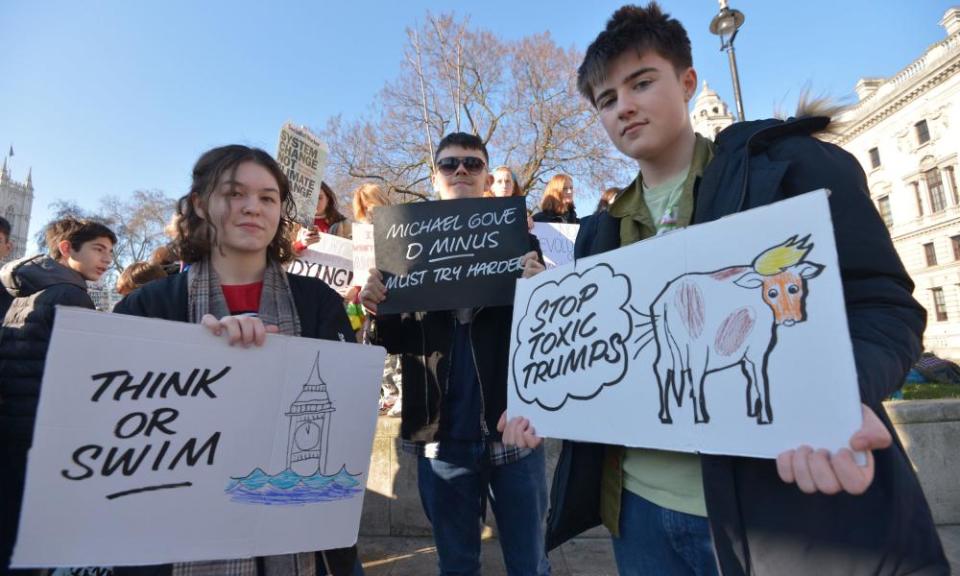Climate strike: UK school pupils take part in call for urgent action
Thousands of schoolchildren and young people in the UK have taken part in climate strikes with the support of a former UN climate chief, who said it was “time to heed the deeply moving voice of youth”.
Christiana Figueres, who led the historic 2015 Paris agreement, said the fact that children were so worried about their future they were prepared to strike should make adults take urgent action.
“It is a sign that we are failing in our responsibility to protect them from the worsening impacts of climate change,” she said.
Initial reports suggested several thousand children walked out of lessons on Friday in protest at the mounting ecological crisis. Organisers said 3,000 had gathered in London, 2,000 in Oxford, 1,000 in Leeds and Exeter and 600 in Brighton.
Jake Woodier, of the UK Youth Climate Coalition, which is helping to coordinate the strikes, said: “What we’ve witnessed today is thousands upon thousands of students and young people descend on their towns and cities to demonstrate the urgent need for radical climate action.
“The size of the Youth Strike 4 Climate is testament to the passion and awareness among young people that we need to fight for a future that simply doesn’t exist because we’ve been betrayed by the inaction of those in positions of power.”

Organisers said action was planned in at least 60 towns and cities across the UK, from Cornwall to the Scottish Highlands, in an attempt to force politicians to tackle growing environmental problems.
Anna Taylor of the UK Student Climate Network, , said: “We’re running out of time for meaningful change and that’s why we’re seeing young people around the world rising up to hold their governments to account on their dismal climate records.
“Unless we take positive action, the future’s looking bleak for those of us that have grown up in an era defined by climate change.”
The movement started in August when Greta Thunberg, a 16-year-old schoolgirl, held a solo protest outside the Swedish parliament. Now, up to 70,000 schoolchildren each week hold protests in 270 towns and cities worldwide.
'Never too small to make a difference'
Thunberg (16) began a solo climate protest by striking from school in Sweden in August 2018. She has since been joined by tens of thousands of school and university students in Australia, Belgium, Germany, the United States, Japan and more than a dozen other countries.
'Irresponsible children'
Speaking at the United Nations climate conference in December 2018, she berated world leaders for behaving like irresponsible children. And in January 2019 she rounded on the global business elite in Davos: “Some people, some companies, some decision-makers in particular, have known exactly what priceless values they have been sacrificing to continue making unimaginable amounts of money. And I think many of you here today belong to that group of people.”
Inspiration
Veteran climate campaigners are astonished by what has been achieved in such a short time. Thunberg has described the rapid spread of school strikes for climate around the world as amazing. “It proves you are never too small to make a difference,” she said. Her protests were inspired by US students who staged walk-outs to demand better gun controls in the wake of multiple school shootings.
Family
Her mother, Malena Ernman, has given up her international career as an opera singer because of the climate effects of aviation. Her father is actor Svante Thunber. Greta has Asperger’s syndrome, which in the past has affected her health, he says. She sees her condition not as a disability but as a gift which has helped open her eyes to the climate crisis.
Individual protests have previously been held in the UK, but the nationwide action on Friday is the first coordinated walkout.
The latest UN report warned there were 12 years remaining to avoid the worst effects of global warming, from record-breaking droughts and heatwaves to warming oceans and melting ice sheets.
Students in the UK are calling on the government to declare a climate emergency, communicate the severity of the ecological crisis and change the curriculum to make the state of the environment an educational priority.
They also want recognition that since young people have the biggest stake in the future they should be involved in policymaking, and are demanding that the voting age be lowered to 16.
Earlier this week, more than 200 academics, including almost 100 professors, backed the strike, saying the “tragic and desperate facts” of the unfolding climate emergency and the lack of meaningful action by politicians left young people with little option but to take matters into their own hands.

 Yahoo News
Yahoo News 
